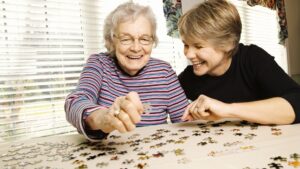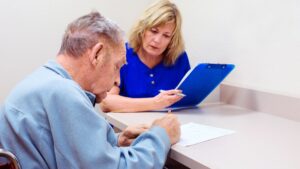Post-Stroke Therapy in Dubai
Recovering from a stroke can be challenging, but with the right therapy, significant improvements are possible. At Talking Brains Center in Dubai, we provide specialized post-stroke therapy, including both occupational and speech therapy. Our goal is to enhance daily functioning and improve quality of life.
Post-Stroke Occupational Therapy in Dubai
Our occupational therapy focuses on restoring your ability to perform daily tasks. Through personalized treatment plans, our therapists help you regain independence by improving motor skills, cognitive abilities, and coordination.
Speech Therapy After Stroke
Stroke survivors often experience difficulties with speech and language. Our speech therapists specialize in helping you rebuild communication skills, offering tailored therapy for speech production, comprehension, and cognitive-communication strategies.
Learn more about this neurological disorder below.
A Stroke is a brain injury caused by a blocked or burst blood vessel in the brain. The consequences vary depending on its location in the brain.
A stroke is a dangerous and life-threatening medical condition wherein the blood supply to a part of the brain is disrupted. A stroke requires immediate medical attention, and life-long damage can be prevented if a person gets treated for it at the earliest.
A block in the left side of the brain causes more occupational difficulty, as it results in difficulty in moving the right side of the body, loss of spoken and written abilities, reasoning and numerical abilities.
A stroke on the right side causes difficulty in moving the left side of the body, lack of music appreciation, spatial relations and vision problems.
While some have difficulty in understanding words spoken to them, others have difficulty in naming or conversing, reading and writing issues.
Some experience just slurring of speech.
Our Speech-Language Pathologist in Dubai can help in diagnosing and treating the communication difficulties.
1. Challenges in Judgment or thinking
- Acting differently than usual
- Acting without thinking
- Being moody and feeling more sad than usual
- Having trouble organizing things
- Not caring about things
- or understanding how things work
2. Difficulty swallowing
Dysphagia affects more than 50% of stroke survivors.
Fortunately, the majority of these patients recover swallowing function within 7 days, and only 11-13% remain dysphagia after 6 months.
However, longstanding swallowing problems can place them at risk for pneumonia, malnutrition, dehydration, and significantly affect quality of life.
It is important that a Speech-Language Pathologist assesses and treats the oral muscles to improve swallowing.
3. The trajectory of recovery varies.
The trajectory of recovery varies.
Most stroke survivors can improve their ability to communicate, but no one can tell you how much improvement to expect.
The fastest improvement usually happens in the weeks and till 6 months right after the stroke.
Between six months and a year, progress may slow down. But with ongoing effort, improvement may continue for years, though typically at a slower pace.
- Difficulty talking, naming, conversing, reading, writing, and recognizing numbers.
- Difficulty understanding words and sentences
- Trouble in swallowing
- Challenges in judgment or thinking
- Instability in emotions such as mood changes, loss of interest
- Sudden numbness or weakness in the face, arm, or leg, especially on one side of the body.
- Sudden confusion, trouble speaking, or difficulty understanding speech.
- Sudden vision problems in either one or both eyes.
- Sudden difficulty walking, light-headedness, losing your balance, or having poor coordination.
Following a stroke, everyone adjusts in their own way. While some stroke-related side effects may become apparent right away and, perhaps with therapy, be relatively short-lived, others may take months or even years to become apparent and may be long-lasting. To have the best post-stroke quality of life possible, you must receive proper rehabilitation and support from your care team. Talk therapy with a psychologist or social worker and support groups, whether online or in person, can also be used as coping strategies in addition to physical, occupational, and speech therapy.
Through its ability to support patients in regaining their motor, cognitive, and emotional skills, therapy is necessary for stroke rehabilitation. The brain damage brought on by a stroke frequently affects muscle strength, balance, and coordination, which are aspects that physical therapy helps stroke survivors regain. Relearning everyday living tasks like dressing, eating, and bathing oneself can be difficult after a stroke. Occupational therapy helps patients in this process. Patients who have trouble swallowing or communicating can benefit from speech therapy, while cognitive therapy helps patients better pay attention, remember things, and solve problems. Additionally, therapists provide emotional support to help stroke survivors manage their depression, anxiety, and other common mental health problems.
At TBC, our Lebanese therapists in Dubai, UAE are experts in speech therapy, occupational therapy, and psychomotor therapy, providing support for patients, including those recovering from a stroke. Offering sessions in Arabic, French, and English, we help patients navigate their recovery and overcome challenges with a comprehensive therapeutic approach.




